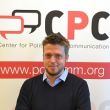Scholar report: Andreas Schuck, PhD
In this scholar report Dr Andreas Schuck from University of Amsterdam discusses his time as a guest lecturer at UTS Sydney

Andreas Schuck, PHD, is an Associate Professor of Political Communication at the Department of Communication Science, University of Amsterdam.
In March 2013 I spent three weeks as Visiting Scholar at the Faculty of Arts and Social Sciences at the University of Technology Sydney (UTS). Catriona Bonfiglioli, senior lecturer in Media Studies in the Journalism, Information & Media Studies academic group welcomed me and helped me with setting up a program for my stay at UTS and helped with all sorts of practical matters. On my first day I participated in the opening event for the new students in the Journalism program at UTS at which Professor Alan Knight, Head of the Graduate School of Journalism at UTS, welcomed the students, and awards were handed out for the best graduate projects from the previous year.
My first lecture was a guest lecture for Media Studies Sub Major undergraduates on “Accounting for active audiences in media effects research” in their course on “Audiences, Users, Public, Communities”. In this lecture I introduced some of my research findings from recent projects which illustrate that audiences do not just passively ‘consume’ news media or would all be affected in the same way but rather perceive content very differently and in light of their pre-existing attitudes and experiences. Sometimes this can lead to positive news on a certain political topic to be perceived as negative from the standpoint of an individual and vice versa. In such a way, positive news on a topic can mobilize skeptics in politically relevant ways (searching for more information, getting more engaged, becoming more likely to vote in an election or referendum) because such news is perceived as negative by an individual and negativity is known to have mobilizing potential.
Following this first guest lecture I conducted a Media Studies Research Methods Seminar on “Designing Media Effect Research” for staff members of the Journalism, Information & Media Studies academic group. This workshop was organized by the Cosmopolitan Civil Societies Research Centre and the Australian Centre for Independent Journalism at UTS. A lot of my research deals with media effects and how to develop research designs which can test and measure these. Mostly this is done with experiments in which respondents are exposed to different kinds of media stimuli or a combination of media content analysis and panel surveys. In this workshop I introduced the basic idea behind these research designs and talked about how to set up, conduct and analyze such studies and results. I very much enjoyed meeting other staff members in this workshop and found the discussion to be very stimulating and engaging.
I was also invited for another guest lecture in the Journalism Studies program, this time I spoke about “New Perspectives in Media Effects Research”, with a focus explicitly on the most recent trends and developments in this field. I was very happy to meet the group of Erasmus Mundus exchange students who had received a scholarship to study at UTS in this seminar and they were easily recognizable as a group as each one of them got very engaged in the discussion and asked a lot of questions following the lecture.
Finally, since a lot of my research deals with the media portrayal of the European Union (EU) and the effects of such coverage on public opinion and political attitudes and opinions of citizens, I was also invited by Professor Tony Maniaty to give another guest lecture in his seminar on Journalism and Europe. I very much enjoyed this opportunity and to talk about some research I and my colleagues have been conducting on campaign effects during European Elections and Referendums. It was very interesting also for me to receive feedback and questions from a non-European, Australian perspective and to compare some of our findings and conclusions with the situation there. In this lecture I also talked about some recent research I conducted on the role of emotions in news coverage and election campaigns and hear more about the Australian situation in comparison.
As well as these lectures and workshops I had the chance to meet and discuss with a lot of staff members and PhD students of the Journalism research group at UTS. These have all been very interesting and fruitful and directly related to some of my own ongoing research projects. I met with Professor Tom Morton, Head of the Australian Centre for Independent Journalism, who is involved in research on climate change and environmental communication which is the topic of a cross-national comparative research project I am currently in the process of setting up. I also met Helen Vatsikopoulos to talk more about the Erasmus Mundus program and opportunities to get involved in and interact with staff members from other European and non-European partner institutions. And I met Cale Bain, a PhD student who does research on political satire and political entertainment, which I and some colleagues in Amsterdam had just conducted a study on in a European context.
In each case I found the interaction with the colleagues at UTS very inspiring and of direct use for my own work and research. I am very grateful for my time at UTS and for meeting so many interesting people and to hear about so many other research projects. I am especially grateful for Professor Alan Knight as Head of the group to host me and let me be part of the group for this short time period and to Catriona Bonfiglioli for being such a great host and getting me involved and engaged in various activities while I was there.